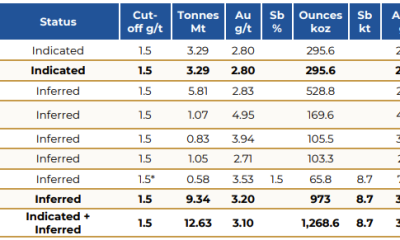Precious Metals
Scaling Success: How the Official Charts Company stays ahead of the curve
We spoke to Martin Talbot, CEO of Official Charts Company, about C-Suite Roles, AI, the future of the music industry, and much more. Before we start, can…

We spoke to Martin Talbot, CEO of Official Charts Company, about C-Suite Roles, AI, the future of the music industry, and much more.
Before we start, can you explain a little bit about the Official Charts?
We are what we say on the tin, I suppose – we produce all of the “official” charts and data for the UK entertainment industry, every day of the week, from data contributed by around 8,000 different retailers/Digital Service Providers (DSPs). Over the past 11 years, we have also evolved to become an online publisher, developing an advertising-supported web platform which attracts two million music fans every month, a total of three million visits. As well as being a fast-growing revenue generator, the platform sits at the heart of our communications strategy too, providing us with our own channels to reach music fans of all ages and types.
As a chart organisation, we are owned by the industry – the labels and DSPs/retailers (via their trade associations, BPI and Era respectively) are our owners and contribute to the evolution of the chart and all of the rules which govern them. I’m pleased to say, we are considered to be the global gold standard at what we do.
You are the Chief Executive of the Official Charts, how did you get to this position and what advice do you have for entrepreneurs looking for C-Suite roles?

(L) Ed Sheeran, Singer-Songwriter, and Martin Talbot, CEO of Official Charts Company.
I began my working life as a journalist, developed a specialism (in the music business) by moving to Music Week and then got the opportunity from there to take the reins at the Official Charts Company. It may not sound like a natural route, but it is logical for many editors to step up to become publishers, to run the platforms, magazines or newspapers they write for – and the Official Charts Company is not that dissimilar, in that it is a business which creates content and monetises it. In the case of Music Week, that was business information; in the case of the Official Charts Company, it is business data and charts.
My advice for entrepreneurs and would-be business leaders would be to find something you are passionate about and understand what it is you love about it. That’s the first step to understanding why the rest of the world (potential customers, clients and partners) will want to work with you.
What have you learnt working with some of the most well-known artists in the industry?
Well, like everyone, they enjoy success. And, the entertainment industry is so competitive and so difficult to break into, it really means something when you genuinely arrive and achieve. The celebrations of so many artists, when we present them with our Award, is a clear illustration of that.
The joy of working for the Official Charts is the celebration of achievement that runs through every day at the company. If you think about it, charts are about celebrating the Number 1, the Top 5, the Top 10, the Top 40, never the “Bottom 40”; our enthusiasm is for recognising the entertainment sector’s success stories. Sadly, today’s media environment attracts a huge amount of negativity – social media comments, traditional reviews, just general sniping – and what we do is a clear antidote to that.
[contact-form-7]
The consumer-facing website for the Official Charts reaches over two million consumers, with over five-million-page impressions. What advice do you have for entrepreneurs looking to scale their websites and business?
OfficialCharts.com is incredibly important to us, it provides us with a platform to project our activities and amplify the successes that we commemorate, alongside our social channels. We have put a vast amount of work into it over the past decade and now punch well above our weight as an independent online publisher. The key to the success we have seen is understanding our audience and serving them with what they want.
Our audience is complex, ranging from older chart fans, many of whom love the sense of nostalgia that our charts ignite, through to the Gen-Zs celebrating their contemporary pop favourites and the successes of their favourite artists. We have worked extremely hard to ensure we have services tailored for all demographics, whatever their level of interest.
How has the move to a digital age and streaming platforms affected how the charts are measured, and has this had a serious impact on artists?
Throughout the history of the charts, evolving to reflect the changing ways in which music fans access their favourite artists’ singles and albums has always been essential. The first charts in the early Fifties counted the popularity of 10-inch shellac discs, which evolved into 7 and 12-inch vinyl, CDs, cassettes and on and on into the digital age. The emergence of downloading meant that every piece of music ever made (barring one or two notable exceptions) became available, the result being a huge explosion in the availability of music.
That is great for music fans, who can now listen easily to any track or album in history, but it makes it much more competitive for artists and therefore much tougher. So, on the plus side, when I grew up and discovered David Bowie for the first time, I discovered Ziggy Stardust by default almost, because it was the only album stocked in my local shop. Teenagers today, in contrast, have instant access to his entire catalogue via streaming. On the other hand, any new rock artist (for instance) is now competing with all the other new rock acts, plus the easily available catalogue of all the rock greats, Deep Purple, Led Zeppelin, AC/DC, Black Sabbath etc. This phenomenon, the “tyranny of choice”, as some call it, has affected music creatives in a fundamentally different way to other creative industries, I would say.
Moving onto the article you recently penned for musicweek.com. You talk about the longevity of the charts, how difficult is it to keep up with the moving times, is this something that is easily done by reviewing data?
It is a fundamental part of the job, really. We are lucky in being so embedded into the industry via our ownership, which gives us direct reference to so much insight and knowledge. The key is to keep ahead of the curve and prepare for change before it moves into the mainstream. The latest facets of this have been with NFTs and also AI. We saw the first NFT album chart last summer, but have seen very few since then – but we are ready.
The next priority for us is to make sure that we are ready when the first, legitimate AI-driven releases arrive. Discussions on this are still in the early stages, but we are ready to respond when the time comes. It is what makes doing this job so exciting and invigorating – keeping up to speed with the latest innovations and making sure what we do reflects the ongoing change in technology and culture.
You’ve had a very successful career in music journalism before landing your current role, what has been the highlight of your career so far?
There have been a few – getting my first job at the Hackney Gazette, the opportunity to join Music Week, the offer to work at the NME and also (of course) taking the reins at the Official Charts, all have been great moments. My most enjoyable experience in journalism was creating a brand new team from scratch and launching the Music Week sister title Fono (a pan-European music trade), we really were breaking new ground with a title which was ahead of its time, sadly no longer around.
But my greatest achievement has been steering the charts through a period of such change over the past 10 years, integrating streams into the singles and albums charts and launching the Official Number 1 Award in 2011, which is now presented to over 300 artists, including many icons and global stars (from Paul McCartney and Rod Stewart to Ed Sheeran and Taylor Swift). Creating something from scratch and watching it develop and flourish really is the greatest thing.
Where do you see the music industry going?
There are many, many reasons to be optimistic. The services which are currently being provided to music fans are probably the most comprehensive and of the best value of my lifetime – all-you-can-eat streaming services, ownership both digitally and physically, and collectable formats, there really is something for every type of music fan.
The greatest challenge over the coming years will be managing the inevitable growth of AI-created music, ensuring that artists remain at the heart of the creative process and that we never under-value the uniqueness that they bring. Personally, I have no doubt that the greatest creativity will always emanate from human beings, but there will always be those who will simply chase an immediate cash-in – but, sometimes, short-term dollars do not translate into long-term gold.
What makes a great business leader?
Leading by example is absolutely paramount. The best executives (of any level) also trust those around them, and demonstrate humility when faced with opportunities and obstacles alike, whilst always striving to learn more.
Great business leaders understand all of this and surround themselves with talented people who show the same attributes.
The post Scaling Success: How the Official Charts Company stays ahead of the curve appeared first on Business Leader.

Canadian Silver Co. Will See Big Changes in 2024
Source: Michael Ballanger 12/22/2023
Michael Ballanger of GGM Advisory Inc. takes a look at the current state of the market and shares on stock…
EGR options out Urban Berry project in Quebec to Harvest Gold – Richard Mills
2023.12.23
EGR Exploration Ltd. (TSXV: EGR) has moved from owner to shareholder at its Urban Berry project in Quebec, this week announcing it is optioning…
Crypto, Crude, & Crap Stocks Rally As Yield Curve Steepens, Rate-Cut Hopes Soar
Crypto, Crude, & Crap Stocks Rally As Yield Curve Steepens, Rate-Cut Hopes Soar
A weird week of macro data – strong jobless claims but…









